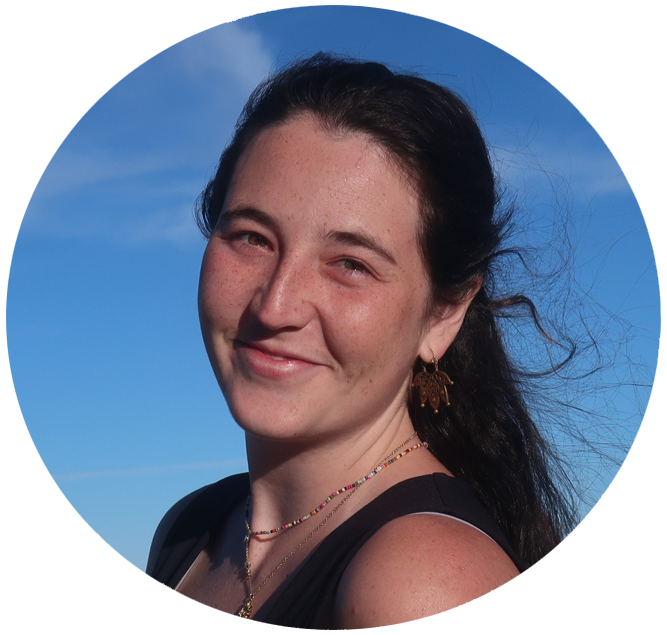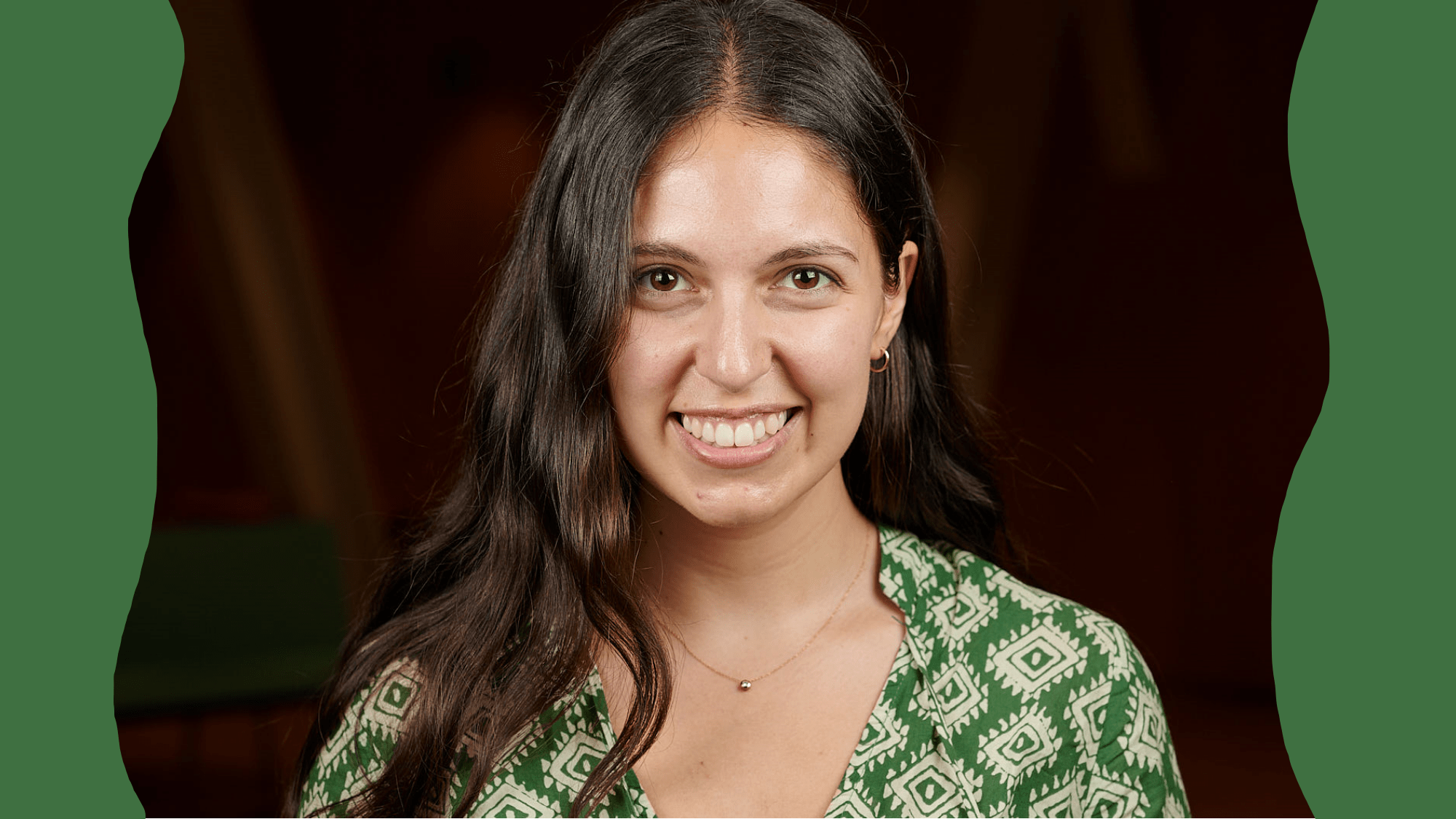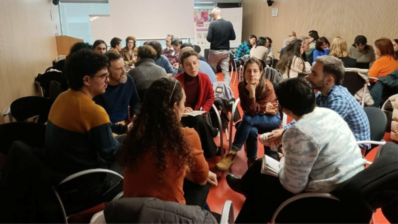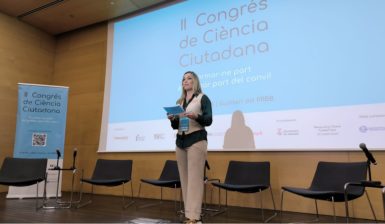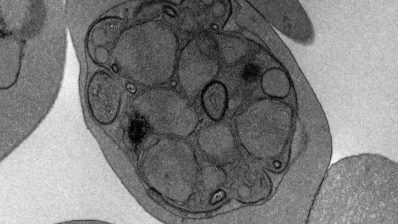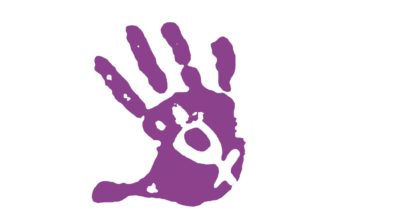Clara Marín Carballo works as a policy coordinator at the Barcelona Institute for Global Health (ISGlobal). She tells us that scientific research is conducted to find solutions and answers that can help the population, but sometimes it does not have the desired impact on society. In fact, it is estimated that, if nothing is done proactively, scientific knowledge takes between 13 and 15 years to have some impact on policy. But this time can be reduced by doing policy.
And what does it mean to do policy? “It is about taking scientific knowledge and acting as a bridge to policies; translating evidence so it can be used to create effective public policies, in our case, health policies. We call this ‘translation‘ process,” says Marín Carballo. In this interview, she tells us more about this profession.
“We take scientific knowledge and act as a bridge to policies”
Clara Marín Carballo (policy coordinator, ISGlobal)
What does the job of a policy coordinator consist of?
From the policy department, our mission is to translate scientific knowledge into policy so that public health policies are created. So, the job consists of understanding scientific evidence, also knowing the policy-making process, and creating the messages and means for scientific knowledge to reach policy.
Depending on who the decision-maker is, you have to adapt. Normally, we transfer our knowledge through documents where the evidence is presented in an accessible way. Arguments are created based on this, and recommendations are made based on the reality of policies.
Why is it important to do policy?
We know that research, creating new knowledge, is very important, but I think we must always bear in mind that one of the goals of creating this knowledge is for it to have some impact on society. We cannot afford for all the knowledge we are generating not to reach people and their health, which is why it is very important that there are people who are somewhat in the middle, who understand scientific knowledge and who understand the policy-making process. People who have the ability to be a bridge so that the impact occurs in a short time.
One of the goals of creating new knowledge is for it to have some impact on society. This requires people who understand scientific knowledge and the policy-making process.
And how do you decide the topics to do policy on?
It is a multifactorial process. We are between pull and push. Most of the time, push occurs; you push and give recommendations. We have established work lines of great importance for global health, such as a line of preparation and response to health emergencies or lines on climate. Additionally, we have a line of foresight, where we inform ourselves about emerging topics because they will be important in the future, such as artificial intelligence in health or the decolonization of global health.
And sometimes the opposite happens: there is a pull. The government calls you and asks for evidence and recommendations. This is what happened during COVID pandemic, for example.
What is your day-to-day like?
My day-to-day is very variable, like the job itself. Sometimes we are traveling for a health policy scientific project, there are days when we are at an event in Madrid with decision-makers, and others when I am at home with my laptop doing a scientific literature review to write a recommendation document. It varies a lot; it is a very non-monotonous job.
Why did you choose this career path?
I have always been very interested in the social dimension of medicine and health. I fully understand the great importance of a hospital, a health center, diagnosis, treatment; but in the end, this is very individual. I have always been interested in going a little further back and seeing how the health of the population can be influenced at a preventive level, but also at a social level, which is why I chose my medicine specialty. And, on the other hand, I was also very interested in the issue of policies, which is why I specialized in this field.
I have always been interested in going a little further back and seeing how the health of the population can be influenced at a preventive and social level.
How did you get here?
I studied medicine and then did the MIR in the specialty of Preventive Medicine and Public Health. It is a very peculiar specialty because it is a very different training path from that of other residents. In our first year, we do a master’s in public health and work in the hospital on preventive medicine topics.
I specialized at Hospital Clínic, which gave me quite a bit of freedom to choose my training path. I did a master’s in Management and Public Policy, and when I finished my residency, I started directly as a policy coordinator at ISGlobal. I also worked in Chile during the pandemic with migrants and was in Morocco leading cooperation projects.
Are there other paths to end up working in policy?
Yes, definitely! Our team is multidisciplinary, and in fact, it is a job necessity. We couldn’t be a team of just doctors doing this. There are many careers and training options, the only important thing is to be able to understand a bit of the scientific part and the more political part.
What is the human team you work with like?
Officially, there are 4 people in the department. The director is an economist, another colleague is like me, a public health specialist, and another colleague is a political scientist. We also work very closely with another person from the Advocacy department, she is a lawyer.
What is the difference between policy and advocacy; aren’t they the same?
The difference is that advocacy works more at the legislative level, they are always in conversations with parliamentarians. It is done from a technical law level and has a final liaison role with Congress. On the other hand, from policy, we go a little further back and do the first part of translating the scientific knowledge.
What do you like most about your job?
I think being in contact with many different people. In the end, you learn a lot day by day and become a more tolerant person towards other ideas. It is very fulfilling, really.
What are your main work tools?
First of all, my scientific background. I use it daily because, in the end, what we handle most are methodologies and global health topics that we end up translating.
I also have training in management and public policies, and I use that daily too because you have to manage all the concepts related to policy. You have to understand very well how the process is because sometimes from the science side, it is not understood that scientific evidence is just one more piece of the puzzle, and it is not the only one to consider. You have to take into account economic, social, political aspects, etc. That is why you have to know the other pieces and have social skills, it is a job where you talk to many people with very different perspectives.
Scientific evidence is just one more piece of the puzzle, it is not the only one to consider when making policies.
What are the challenges of your job?
Having to adapt a lot is always a challenge because you have to be constantly learning and, it will sound very romantic, but you go out of your comfort zone a lot, and it is hard. You have to study topics that you may not know much about to give recommendations. And giving recommendations is a challenge in itself because you have to give them with a degree of certainty that science usually does not have…
When you are recommending someone to create a policy that costs public money, alhtough you cannot assure them that it will work, you have to give them a certain level of certainty. Making this change from rigid thinking to being more flexible for someone coming from science is very difficult.
What skills do you think are most important for your job?
Tolerance to frustration, because sometimes you have a very clear and informed opinion but the policies do not end up being exactly as expected. Or because you see political injustice on some issues. Over time, this develops humility. You also need tolerance, flexibility, and empathy, and be willing to work in a team to seek help and give help when necessary.
What advice would you give to someone who wants to pursue this profession?
First, to be interested in current issues, to read and be informed through the press and to see how political changes are managed. Secondly, it is not necessary to do a master’s in the other field, but I think it is about having a certain entry-level training to be able to understand the scientific and political parts. And, of course, to be flexible, empathetic, and a bit humble because you come into contact with many different perspectives and visions, and you need to have an open mind.
How do you see your future?
